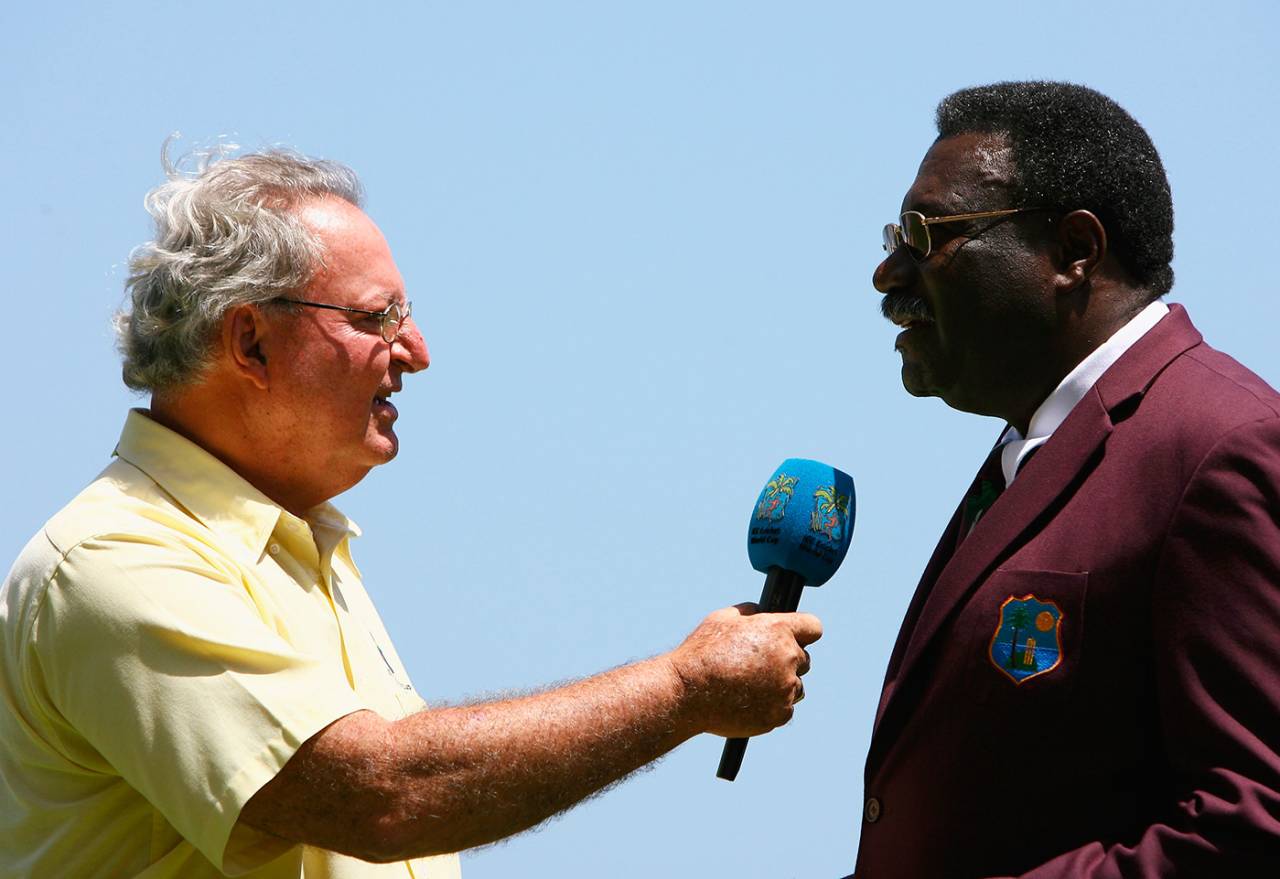I read
Tony Cozier before I heard him. I borrowed his seminal
Fifty Years of West Indies Cricket from a school friend and read it at breakneck speed, savouring the new understanding - in the political and cultural dimensions - I had suddenly gained of my favourite cricketing outfit. Here was history, outrage at colonial-era slights, pride in West Indies' cricketing achievement, respect for cricketing opponents; here, too, were memorable turns of phrase.
In his report on the fourth Test of the famous 1976 series between West Indies and England, Cozier began his summary of one of the most remarkable first days of Test cricket in the modern era by writing, "An unceasing volley of punishing strokes took the West Indies to 330 for 2 by tea-time." When I came to this sentence, I stopped and stared. Three hundred and thirty in the first two sessions of play on the first day of a Test? Roy Fredericks, Gordon Greenidge and Viv Richards unleashing "an unceasing volley of punishing strokes"? Be still my heating heart. In one phrase Cozier had captured an apparently essential quality of West Indies cricket: the power, the dynamism, the cricketing mastery, and of course, as evident in the "unceasing" and "punishing", the ruthlessness. (The "blackwashed" English teams of 1984 and 1986 would agree.)
Later I heard Cozier too. Perhaps during the 1979-80 tour of Australia, or perhaps the 1980 tour of England. Memory does not dredge up the correct date for me now, but it does resurrect quite effortlessly his mellifluous voice. Long before Michael Holding bewitched us with his Jamaican drawl, a Bajan voice had already entranced us with its take on cricket. And like Holding, Cozier could speak for West Indies cricket with a distinctive mix of protective pride, passion, and when the occasion demanded it, a fierce inwardly directed criticism as well.
This was no casual follower or fan of cricket; this was a man whose very identity was sewn up with that of West Indies cricket. Indeed, when you thought of West Indies cricket in the 1980s, besides the usual cavalcade of names - Lloyd, Roberts, Marshall, Holding, the ones that sent chills scurrying over sundry parts of your anatomy - you thought of Cozier too. He was the storyteller, the interpreter, the historian, the critic; you almost sensed that the WICB (or its older incarnations) had to get his approval for any of their administrative measures. And woe betide the journalist who, in writing on West Indies cricket, displayed prejudice or insensitivity or colonial double standards. The Cozier boom would be lowered on him pretty damn quick. (This happened in the commentary box too, and his fellow commentators had to make sure they weren't rehashing old prejudices or displaying laziness in their takes on West Indies.)
Through Tony we came to see the West Indies as more than just talented and exciting cricketers; we saw them as representatives of a distinct cricketing culture, with a politics and history that had enriched cricket's tapestry in its own particular way
I do not think it is an exaggeration to say that for an entire generation of overseas fans, Tony Cozier was the voice of West Indies cricket. He brought action on distant fields to life; and he made sure you knew the action was being instantiated by a set of players unique in the game. He was West Indies' strongest "representative". He made the strongest arguments for any brief pertaining to it. Pride - and anger when respect is not forthcoming - is part of the fabric of West Indies cricket; this inclination was manifest in Cozier's pronouncements on the game too. Through him we came to see the West Indies as more than just talented and exciting cricketers; we saw them as representatives of a distinct cricketing culture, with a politics and history that had enriched cricket's tapestry in its own particular way.
As West Indies declined, Cozier's criticism of the team, its management, the region's cricket administrators, grew and grew. He was witnessing from an uncomfortable vantage point not just the decline of one of the greatest cricketing powers of all but also of a unique experiment in sporting history: the coming together of nations, a mingling of cultures and ethnicities and histories, to form a unified team, under a common leadership. It is occasion for sadness in more ways than one.
On the day I received
news of Tony's passing, I felt a kind of grief that seemed inexplicable. Tony was a stranger. I had never met him, I did not know him personally. But of course, we don't need to personally know the ones we grieve for. As I wrote
elsewhere, on the passing of another stranger: "The emotions we feel are wrapped up in the deepest recesses of our selves; they reflect memories accumulated over a lifetime, traces of experiences, formative and supposedly insignificant alike."
Tony's voice and writings were a formative part of my self. With his passing, a part of my life has come to a close. RIP Tony.
